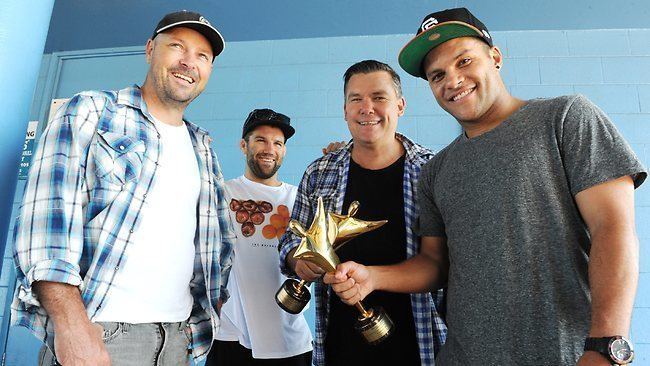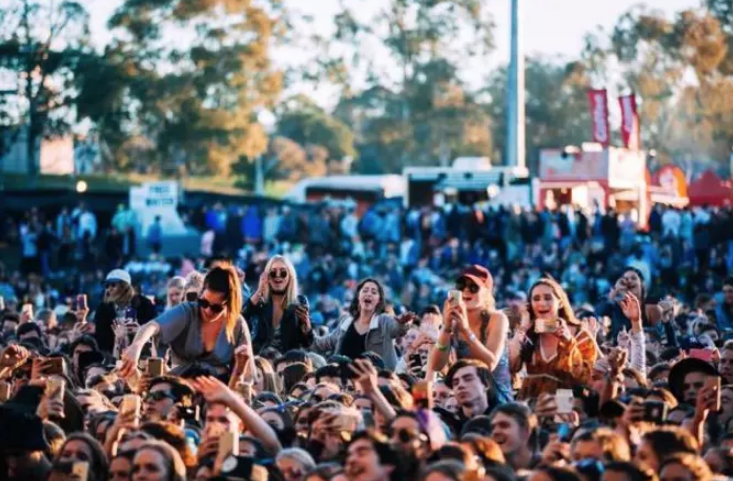Bra Boys filmmaker Macario De Souza on new summer festival flick

Filmmaker and artist Macario De Souza has always had his hands in both film and music and now he’s found a way to bring the two together.
His forthcoming film 6 Festivals has just secured an all-important share of $1.4 million in funding from Screen Australia set to put the wheels well and truly in motion.
It’s a coming of age story about a group of teens who commit to attending six festivals over the summer after their friend is diagnosed with brain cancer.
As a writer and director De Souza has helmed films like Bra Boys and Fighting Fear while also making music under the moniker Kid Mac. He’s been an Australian music festival staple both as a punter and a performer and 6 Festivals bridges together all those experiences.
Australian festival favourites Groovin The Moo, The Big Pineapple, The Drop and Lost Paradise have all signed on to be part of the project which will explore the psyche of the teen’s formative years while also championing the positive aspects of the music festivals.
Following the funding announcement, TMN chatted to De Souza about what we can expect from the film, his own experiences at music festivals and why it’s so important to tell this story right now.
Congratulations on securing funding. You must be pleased?
Yeah absolutely wrapped. Screen Australia is the linchpin of films getting up in Australia so to have this support is unbelievable.
The film is the culmination of your two worlds, bringing together film and music. Was that your intention?
Yeah, it’s always been in my DNA. When we first made Bra Boys I was making music and it all happened together at the same time. I was touring and still making movies. I guess it was a gathering of a lot of my life experiences and inspirations from that world into telling a story from that world which I always found exciting. I always like the idea of pulling the curtains back for an audience that made not be privy to that world.

Is the film completely fictional?
There’s a lot of truth to it. It’s a fictional story but characters and little anecdotes have all come from my experiences over the 8 to 10 years of touring. As a whole, it’s inspired by… when I was younger I lost a few friends to suicide and it really cut us. As young blokes, we never spoke about it but it starts to impact you later in life I feel.
I liked that idea of exploring young teenagers going through some ordeals that they may not be equipped to handle but also the idea of escaping to a music festival. That’s where you can get away from all the shit at home and forget all your other problems for the love of music. Then you go home and face the realities.
The idea of music festivals being a profound experience can often be dismissed but they create so many important experiences for young people. How important have they been to you as both as a punter and a performer?
That’s why I’m so obsessed with festivals. From jumping the fence at a young age to having the money to go and see a few of my favourite acts. Then it is being a social scene – hanging with mates and pulling girls. Then being inspired to be an artist and wanting to play at a festival one day. Then my first ever festival which was Playground Weekend.
I was on the mainstage on the first slot and most of the people in the crowd were my friends. We shoot a lot of content around festivals now with brands and artists so I’ve been involved in all aspects and it never gets boring.
The loose storyline of the film is that the main characters meet an up-and-coming artist who helps them realise their reality. Does that come from your own personal experience?
I think from my early days as an artist I really connected with the Bliss N Eso boys. We met early in the piece and they became mentors. I bounced off them a lot. Even though we were similar ages. It was more though when I was older and touring the country and going to places that may have had less privilege. Kids would come up to me that loved the music and the films. There was an awe in their eyes that you could see they wanted to work towards what I was doing. The questions and the excitement, I used to love that. I used to do what I could to help where I could from free tickets to little pieces of advice.
In my opinion, there’s been a lack of films made for the young audience in Australia that’s local where they can feel a sense of, “this is my culture, I feel a part of this.” Through music festivals and the idea of friendship, I feel like it’s something that’s really going to resonate with a lot of young Australians. That’s really going to shine through that idea of mentorship.
The festivals in the film represent a lot of different regions and sizes. Was it important for you to capture the diversity of Australian festivals?
Big time. The first idea with this was wanting it to be an all Australian soundtrack. We’ve got the best talent locally. There was a lot of talk of international acts but I wasn’t interested. We’ve got the talent we need here and just need to make sure we represent the different genres and communities. The festivals we’re working with gives you a nice cross-section.

Has it been a good experience for you so far working with the festivals?
Look, I’m not going to lie. That’s been the trickiest beast. I had a script and then we started talking to festivals and re-writing the script based on who would work with us. I’m super grateful that guys like Lost Paradise and Groovin The Moo were all for it from the very early stages.
More recently, The Big Pineapple and The Drop came on board, almost like an instant yes because they really connected with the story and wanted to be a part of it. There were others who we spoke to that for logistical reasons it didn’t work out. Laneway. Danny Rogers was the first person I sat with. He was all about it and loved it so having their initial attachment helped open up doors.
For scheduling reasons we didn’t get them into the film but they’ve been great. These festivals see the power in story-telling and the culture. With everything that’s happening with the state laws and all the red tape around the culture, it’s time to show the other side that most people who are anti-good times don’t get to see. It’s time for everyone to unite and celebrate our music culture and nightlife culture.
As you’d know being in the industry a long time, there are people in it to make money and there are people in it for the culture. How nice is it for you to be surrounded by people who are inspired by the community and driven by the positives?
It’s epic. There’s a really good bullshit radar in the music industry and everyone we’ve been talking to have been coming through the ranks as musicians and a lot of the artists are still doing very well at the moment touring. Having that connection really helps. The only ones who are jumping on board are the ones that are about the culture and the music first. The commercial is secondary. It makes the world of difference because you speak the same language and everyone is in it for the same reasons.
How long has this idea been rattling around in your head for?
It’s been about five years. I wanted to make a coming of age film around my experiences and the world of festivals crept into my head. I kept going back and forth with different variations until I felt like we had something. Development of stories can take a while. More recently, it started to pick up momentum and feel real. Then we landed Screen Australia and Universal Music. All those things make you feel like you’re not crazy and you have something good.
There’s a notion of fear that creeps into each of your films. There’s an element in this film of facing your fears and learning to overcome them. Do you think consciously about that?
I’m an emo at heart. I’m a creative and most creatives deal with fear every day in terms of self-doubt. It’s shining through that idea of the fear of losing your best friend and what life is going to be like post-that. Then it’s having to deal with your inner-emotions as a result of everything that’s happening.
I’ve dealt with anxiety and depression issues over the years and I have a lot of friends who do. I like the idea of telling stories that allow people to start the conversation surrounding self-doubt and how we overcome and open up about it. I want something that’s going to inspire the younger generation because we’re just losing too many people.
Keen music festivalgoers are often in their formative years. What’s the one takeaway you want them to have after watching the film?
I struggle with this myself. It’s a case of self-identity and knowing who you are. A lot of people follow the pack. They do what their friends do because it’s the easy thing. For me, the film is about finding what it is about yourself that you feel most comfortable with and going with that. Not necessarily what the rest of the pack do. It’s ok to be different and do your own thing.
As long as your open-minded to not following what everyone tells you to do, there’s other avenues out there.






























